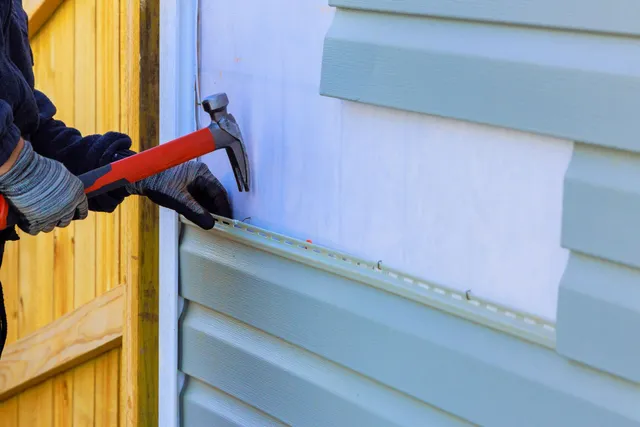Tips
Choosing the Right Siding Contractor in 2025: Key Questions, Warning Signs & Local Search Tips

Hiring the right siding contractor is one of the most important decisions you’ll make when upgrading your property’s exterior. Whether you’re a homeowner planning a complete exterior renovation or a property manager overseeing a commercial installation, the quality of your siding contractor will directly impact the durability, energy efficiency, and visual appeal of your building.
With an increasing number of materials on the market and more contractors offering siding services, navigating the options can be overwhelming. Poor choices can lead to structural damage, water infiltration, and costly repairs down the line.
This guide will walk you through the process, from vetting professionals to understanding the red flags, and using local search effectively to find qualified experts near you.
What to Look for in a Siding Contractor
1. Proper Licensing and Insurance
Every reputable siding contractor should carry the appropriate license required by your state or municipality. Additionally, they should have both liability insurance and workers’ compensation. This protects you from liability if someone is injured on your property or if damage occurs during the project.
Before any work begins, ask for proof of insurance and verify it with the issuing provider. If a contractor hesitates to provide these details, it’s a red flag.
2. Experience with Specific Siding Materials
Not all contractors are trained to work with every type of siding. Installing aluminum siding, for example, requires different tools and techniques compared to vinyl or fiber cement. Always ask whether the contractor has experience with the material you’ve selected. Request to see photos or references from similar past projects.
If you’re unsure about what material to choose, a knowledgeable contractor should be able to walk you through the pros and cons of each option based on your local climate, maintenance expectations, and budget.
3. References and Portfolio of Work
Ask for at least three references from recent clients, ideally within your area. Follow up on these references and, if possible, drive by the completed jobs to assess the quality of work in person. Additionally, look for an online gallery or project portfolio on the contractor’s website. Contractors with nothing to show or who refuse to share client information may not be worth the risk.
4. Transparent Bidding Process and Written Estimates
A trustworthy contractor should provide a clear, itemized estimate that outlines labor, materials, timeframes, and payment schedules. Beware of vague quotes or verbal-only agreements. Everything from start and end dates to cleanup responsibilities should be included in writing.
Compare estimates from at least three contractors to ensure you’re not overpaying—or underpaying for a job that may be cut short on quality.
5. Warranties and Post-Installation Support
Reputable contractors typically offer two types of warranties: one from the manufacturer for the siding product itself, and another from the installer for workmanship. Ask for documentation and details. If a problem arises months later, you’ll want a company that stands by its work and responds promptly.
Red Flags to Watch Out For
Choosing the wrong siding contractor can result in project delays, financial loss, and long-term damage to your property. Here are some common warning signs to help you avoid costly mistakes.
Lack of Online Presence or Physical Office
If you can’t find a business website, Google listing, or verifiable contact details, the contractor may not be established. You should be able to look them up online, read reviews, and see photos of past work.
Extremely Low Bids
If a quote seems too good to be true, it probably is. Low-ball pricing often signals the use of substandard materials, poor installation practices, or a contractor who may abandon the project midway.
Pressure to Pay Upfront
Avoid contractors who demand full payment before work begins. A standard and safe practice is to pay a deposit upfront, followed by milestone-based payments as work progresses.
No Written Contract
Never agree to a siding job without a detailed written contract. This document protects both you and the contractor. If they resist putting things in writing, that’s a clear sign to walk away.
Poor Communication
A reliable contractor should return your calls, answer questions clearly, and keep you informed. Poor communication before the project starts is usually a sign of even worse communication later on.
Using Local Search to Find a Qualified Contractor
The way homeowners and property managers find contractors has changed dramatically. In 2025, local SEO plays a vital role in helping you identify trusted professionals in your area.
1. Start with Google Search and Google Maps
Use search terms like “siding contractor near me” or “[your city] siding contractor.” Check Google Maps listings, read reviews, and visit business websites directly from search results. Pay attention to the contractor’s overall rating, number of reviews, and how recently those reviews were posted.
2. Explore Reputable Directories
Home services platforms such as HomeAdvisor, Angi, Houzz, and Yelp allow users to view verified reviews, see photos of completed jobs, and submit quote requests. While not perfect, these platforms can help you filter out unlicensed or poorly reviewed companies.
3. Review Consistency of Business Information
Make sure the contractor’s Name, Address, and Phone Number (NAP) are consistent across platforms like Google, Yelp, and their website. Inconsistent or outdated information may indicate an unreliable or poorly managed business.
4. Tap into Local Networks
Ask neighbors, coworkers, or members of local Facebook groups who they’ve worked with in the past. Many great contractors build their business on referrals and word of mouth—especially in smaller communities.
Final Steps Before Signing
Once you’ve narrowed your list to one or two candidates, take these final precautions before committing:
- Review the full scope of the contract, including specific products to be used, timelines, costs, warranties, and cleanup procedures.
- Confirm that any subcontractors used are also licensed and insured.
- Schedule a walk-through of your property to clarify expectations and answer last-minute questions.
- Avoid being swayed by overly aggressive discounts or “today only” offers.
Choosing a contractor should never feel rushed. A quality professional will give you time and space to make a confident decision.
Why Customer-Focused Companies Stand Out
With so many siding contractors out there, the companies that truly distinguish themselves are those that focus on customer service, transparency, and long-term value. Homeowners and property managers are no longer just comparing prices, they’re also evaluating communication, follow-through, and post-installation support.
One such example is Family Siding, which has built a reputation for clear estimates, skilled craftsmanship, and ongoing client care. Choosing a contractor with a strong track record and a people-first approach can make the difference between a stressful renovation and a smooth, reliable experience.
Conclusion
Finding the right siding contractor is more than a transaction—it’s an investment in your home or building’s protection, performance, and value. By asking the right questions, spotting red flags, and using local search tools to verify credentials, you can dramatically reduce your risk and hire a contractor who will deliver lasting results.
Whether you’re replacing outdated siding or building from scratch, take your time, do your research, and choose a professional who aligns with your goals. The right contractor won’t just install siding—they’ll help you protect one of your most important assets for years to come.




